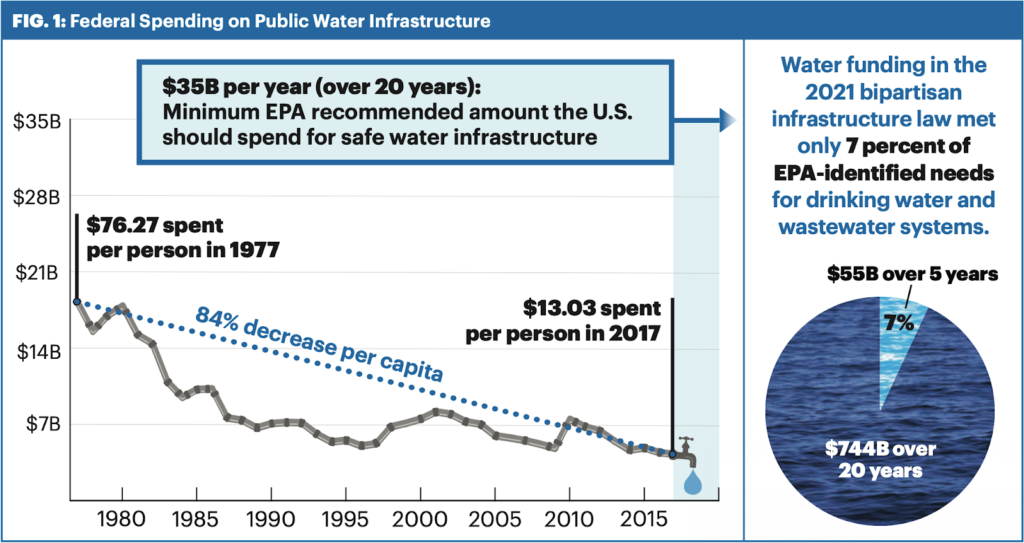More than eight years ago, millions of people watched the water crisis in Flint, Michigan unfold on national television. An entire city was poisoned when decades of federal disinvestment in water infrastructure collided with a racist emergency management regime imposed by former Governor Rick Snyder. Justice was denied to Flint on June 28, 2022, when the state supreme court threw out charges to hold Snyder accountable based on a technicality.
In early 2016, driven by the crisis in Flint, Food & Water Watch worked with our allies on a pivotal piece of legislation: the Water Affordability, Transparency, Equity and Reliability Act — the WATER Act. This month, we reached a major milestone in this six-year campaign. Since it was introduced by Rep. Brenda Lawrence, Rep. Ro Khanna and Sen. Sanders, more than 100 representatives and 6 senators now officially support this legislation. With more than 550 endorsing organizations, we are continuing to grow support in Congress to pass the WATER Act as the landmark water law of the 21st century. We have a lot more work to do to ensure water justice.
A Permanent Water Solution
The WATER Act is the only comprehensive approach to improving our drinking water and wastewater systems. It will create a trust fund to provide funding to meet the level that the EPA says is necessary to update and repair our public and household water systems. To do that, the Act will provide $35 billion annually to restore the nation’s public water infrastructure, including:
- $15.2 billion a year to the Drinking Water State Revolving Fund to upgrade and improve public drinking water systems (including lead pipe removal and treatment for PFAS contamination);
- $15.7 billion a year to the Clean Water State Revolving Fund to pay for publicly owned wastewater system upgrades;
- $1.1 billion a year to fix drinking water infrastructure in schools, including replacing lead pipes and fixtures;
- $1.2 billion a year to help update and install household septic systems and wells;
- $1.4 billion a year to protect drinking water sources from pollution; and
- $349 million a year for technical assistance to rural, small and Indigenous wastewater and drinking water providers.
The WATER Act will help prevent another water crisis like Flint by restoring federal funding to safe water. And it will ensure local communities have the support they need to provide every person access to clean water.
Deepening Water Crises
Many of the water and sewer pipes under our streets were built in the years immediately following World War II. They are outdated and wearing out. Since that era, we’ve learned about many new toxic chemicals that their treatment systems aren’t built to remove. On top of that, they were not built for today’s climate reality.
For many, the signs of our aging water systems erupt to surface in the form of water breaks and sewer overflows. Each year, we waste 2 trillion gallons of drinking water from hundreds of thousands of water main breaks. And in a dire threat to public health, more than 850 billion gallons of raw sewage spills into basements, homes, roads and waterways.
For some communities — disportionately Black and Indigenous communities and communities of color — the harm has been more profound. Communities like Flint and Benton Harbor, Michigan face toxic lead poisoning, while communities like Jackson, Mississippi and Puerto Rico have faced climate change-fueled catastrophic system failures.
The Bipartisan Infrastructure Law Fell Short
When President Biden signed the bipartisan infrastructure package into law last year, it provided a downpayment on our water improvements. But it falls far short of what our water systems and our communities desperately need.
According to the EPA’s latest assessments, our water systems require at least $744 billion in investment over the next 20 years. That’s more than $35 billion a year — just to comply with existing federal law.

The Bipartisan Infrastructure Law provided only 7% of the funding that our communities require to meet existing water quality standards. Congress needs to hear that the Bipartisan Infrastructure Law cannot be the end of support to fund clean and safe water for everyone.
We need a permanent water solution. We need the WATER Act.
Tell Your Congress Members to Cosponsor the WATER Act Today!


